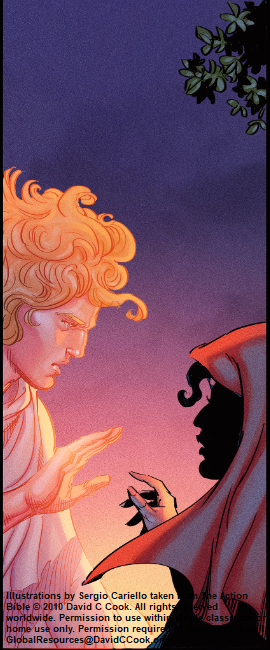During the lesson, the information for you to know is written in regular type, and what we suggest speaking or reading aloud to children is in bold. All resources for this lesson, including the Teacher Guide, Student Page, Family Connection Card, and other resources can be downloaded in a ZIP file by clicking on the following link:
In some lessons you will find "resource articles." These are articles written by experts from around the world to help equip you for your work with children and adolescents. Share them with parents or guardians if you consider it appropriate.
If you are doing the optional activity in the Connecting section, before class place the items at the front of your teaching space and cover them with a cloth.
Are not two sparrows sold for a penny? Yet not one of them will fall to the ground outside your Father’s care. And even the very hairs of your head are all numbered. So don’t be afraid; you are worth more than many sparrows.
Matthew 10:29–31
Look at the birds around you. Do you even notice them on a regular basis? Or do they seem invisible to you most of the time? Our great God is the God Who Sees. He notices every little sparrow that falls to the ground. How great is His care for His creatures.
Do you ever feel invisible? Like you are not noticed? The Creator of everything in our world sees you! You are not invisible to Him! Think about how incredible it is that this powerful God notices every detail of your life, down to the very hairs on your head. Spend a few minutes worshipping Him in gratitude that He sees you.
Let the children’s families know that today they will learn that God is the God Who Sees them. Children often feel overlooked by the adults in their lives. Encourage families to spend a few moments this week truly paying attention to one another. What new things do they notice about their children?
Teacher Tip: If possible, email or text the Family Connection Card to the families of your students.
Welcome your children to class and remind them that for the next few weeks you will learn about some of the names of God that will show them more of what He is like.
Begin class with a guessing game called “I See” to get the children thinking about times when they felt like no one noticed them.
Today we will play a guessing game. I will choose something that I can see from where I am. Then I will give you a clue about it. Raise your hand if you want to guess what it is that I see.
To begin, choose an object you can see, such as a red shirt someone is wearing. Your clue can be a colour or a shape or some other simple descriptive word. For example, you might say, “I can see something that is red.” Do not look directly at the object when you give the clue. Children will then raise their hands and guess any objects they can see that are red. It might be the shirt or it could be something else. To make the game interesting, try to choose clues that fit many objects.
Once the children learn how to play the game, allow the children to take turns giving clues for things they can see. If you have a very large class, you can divide the children into groups of about 10 and let them take turns being the one who chooses the object and gives the clues. After playing for several minutes, gather everyone back together if they split into groups.
Our game reminds us that our eyes are a special gift from God. With them we can see many things. Sometimes we can see something but not really notice it. For example, we can see people and not really notice them. It is almost like they are invisible.
You can see something when you look at it carefully. Sometimes you look at things and your eyes do not really focus on them. But when you pay attention, you notice the details.
Optional Supplies:
If you have the optional supplies, do this activity to see how well the children pay attention when they look at several objects. The more attention they use when they look at the objects, the more objects they will remember. Before class you should have placed several common objects on a table or floor and covered them with a cloth. Let small groups of children quietly come up and look at the objects for 1 minute. They must remain silent. Then the children return to their seats and try to remember all 12 objects they saw on the tray. After all the children have looked at the objects, have them take turns naming 1 thing they saw. Continue until all 12 objects have been mentioned.
End of Option
Each time that you hear me say “the God Who Sees,” cup your hands around your eyes like you are looking through them like glasses.
Allow children to briefly share what they know.
God is so great that He can speak something new to you even through Scripture you have heard before. Listen as I briefly share about a woman named Hagar.
Remember that Hagar was a servant to Sarai, Abram’s wife. God had made a special promise to Abram and Sarai to give them a son even though they were old.
As the years passed, Sarai got tired of waiting. She gave Hagar to Abram as another wife so that Hagar could have a baby for her. In those days, there was a custom that a servant could have a baby for a woman and that baby would be like the woman’s own child.
After Hagar became pregnant, she began to despise Sarai. Sarai complained to Abram. He told her to do whatever she wanted to Hagar. So Sarai turned on Hagar and treated her badly. The Bible does not say how she mistreated her, but she may have yelled at Hagar or beat her.
Optional: If possible, share the image from The Action Bible.

Hagar ran away into the desert. While she was there, “the angel of the Lord”—who represented God Himself—came to her and asked what she was doing in the desert. The angel told her to return to Sarai. The Lord promised to take care of her and her son. Hagar called the Lord “the God who sees me.”
The Bible does not tell us what Hagar felt during this time. She may have felt like no one saw what was happening to her. She may have thought no one cared when she was mistreated. She could have felt invisible.
But what Hagar learned was that God saw her. He is the God Who Sees. He cared about what she was going through. He told her that she had a future. What God promised Hagar came true.
Hagar discovered that even when she felt alone and invisible, the God Who Sees was with her. He saw her and told her about the plans He had for her and her son.
Let’s listen to another short story about someone you have heard about before: Joseph. Remember that Joseph was about 17 years old when his brothers betrayed him. Most of them wanted to kill Joseph, but they threw him in a dry well instead. Then they decided to sell him as a slave. Eventually he ended up in Egypt, and God used something that was meant for evil for His good purposes.
Again, the Bible does not tell us what Joseph felt when these things happened to him. I want you to imagine for a moment that you are Joseph.
Allow 2–3 children to respond to each question.
Now we know that at the end of Joseph’s story, he said that he knew that God had worked things for good. Joseph knew the God Who Sees.
Listen to one last short story about a widow. Jesus and His followers were sitting across from the place where people put their offerings as they went to the temple. Jesus watched as many rich people dropped in their offerings.
Then a poor widow came and dropped in 2 very small coins. The Bible does not tell us that anyone saw her or spoke with her. It seems that she was invisible to those around her. But not to Jesus!
He made a point of telling His followers what she did. He saw her. He saw her offering that was given out of her deep poverty rather than her riches. He saw what was in her heart. He is the God Who Sees.
This same God Who Sees notices you!
Have you seen a sparrow, one of the most common birds in the world? Most of the time, we do not notice the little birds because they are so common. They seem unimportant. In some places in the world, sparrows seem to be disappearing. We cannot be sure because no one counts sparrows. And hardly anyone would care if they disappeared.
In Jesus’ time, you could buy 2 sparrows for less than the smallest coin. And yet, Jesus said not a single sparrow falls to the ground without God knowing it. The Lord is the God Who Sees! Listen to what Jesus says about sparrows and about you:
If you are using the Memory Verse Poster, show it to the students.
Are not two sparrows sold for a penny? Yet not one of them will fall to the ground outside your Father’s care.And even the very hairs of your head are all numbered. So don’t be afraid; you are worth more than many sparrows.
Matthew 10:29–31

Turn to a partner and count the hairs on her head until I tell you to stop.
Give the children about 30 seconds to count hairs. Ask them if any of them counted all the hairs on their partner’s head.
In these verses, Jesus reminds us not to be afraid because we are worth more to God than many sparrows. He knows every hair on our heads! This is what Hagar realized when she said that the Lord is the God Who Sees. We are so precious to God that He looks at us with great love.
Turn to 2 other children and tell them, “God sees you! He knows the number of hairs on
your head!”
Now close your eyes for a moment. Think about times you feel alone. Did you realize that God sees you in those times? He loves you right there when you feel alone, even when you do not know He is there. Think about how knowing the God Who Sees can give you strength and hope. Listen for a moment to hear what He might want to tell you.
Think about what it means to you that our God sees every sparrow that falls. You are worth so much more to Him than many, many sparrows. What is God saying to you about how precious you are to Him?
Allow a few moments for the children to consider that God sees them!
Optional: If you are using the Student Pages, allow the children to write “God sees me” on their pages. Then they can draw or write about how they feel knowing that He sees them.

Close class today by praying for the children this blessing based on Matthew 10:29–31.
Blessing: May you know that the God Who Sees is watching over you. He loves you so much that He even knows how many hairs you have on your head. May you rest knowing that you are very valuable to Him.
Lead the children in singing this quarter’s song, if possible.
Life on Life ©2020 David C Cook. Reproducible for home or classroom use only. All other uses require written permission from David C Cook [email protected]. All rights reserved.